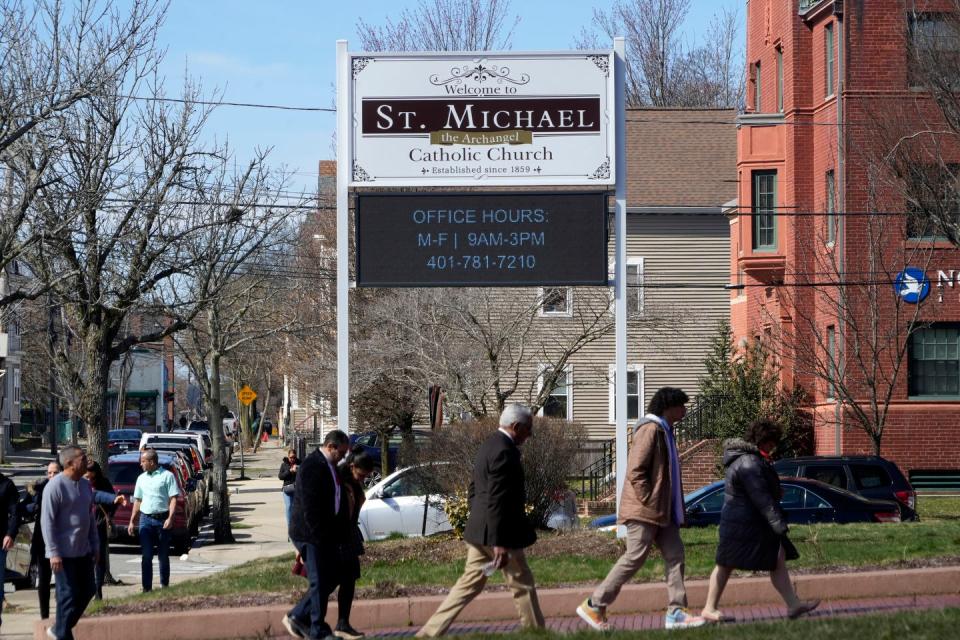Parishioners should not lament church's shift from activist path. Here's why. | Opinion
Craig Cooley is an educator from Providence.
Amid ongoing debates surrounding the direction of the Catholic Church, it is refreshing to see priests like the Rev. James Ruggieri embracing the traditions that have guided the faith for centuries. While some may view his leadership style as rigid or authoritarian ("Spiritual conversion," News, June 18), it is important to recognize that his approach is deeply rooted in the teachings of Catholicism itself. Rather than succumbing to the pressures of modern progressive ideologies, Father Ruggieri has remained committed to upholding the theological truths of the faith.
St. Michael the Archangel Church, once a beacon of progressive Catholicism, has transformed under Ruggieri's stewardship. Former parishioners who lament the departure from the Providence church's activist past should note that Catholicism is not synonymous with activism alone. The church's mission extends beyond social justice causes and encompasses a comprehensive understanding of faith, morality and salvation.
More: Bishop Richard Henning leads Providence Diocese. Here's his vision for RI's Catholics
The departure of some members highlights a broader tension within the church itself. The progressive strain of Catholicism that emerged after Vatican II has often prioritized secular values over centuries-old doctrine. Ruggieri's leadership at St. Michael's signifies a renewed focus on worship and adherence to Catholic teachings.
Critics argue that the shift in leadership has stifled the church's social justice efforts, but they overlook the distinction between charity and advocacy. Ruggieri's commitment to charity work within the community is commendable. His involvement with programs such as homeless assistance and inner-city education demonstrates his dedication to serving those in need. However, he also recognizes the limitations of charitable works alone, understanding that true societal change requires a deeper transformation of hearts and minds.

The criticism directed at Ruggieri's leadership style is misplaced. The church is not a democratic institution where every voice is equal in matters pertaining to doctrine. Instead, it is a hierarchical structure wherein bishops and priests are entrusted with preaching and teaching. Upholding these teachings, regardless of popular opinion, is not an act of authoritarianism but rather a testament to the unchanging truth of Catholicism.
The symbolic changes that have drawn strong reactions from former parishioners, such as replacing folding chairs with traditional pews, reveal a deeper theological underpinning: a return to the sacredness of the liturgy. By restoring a sense of reverence, Ruggieri is reestablishing a spiritual atmosphere where worshipers can immerse themselves in a profound encounter with the divine.
It is crucial to recognize that Ruggieri's approach is not a rejection of diversity or inclusivity. Rather, it seeks to transcend the superficial aspects of diversity and focus on the universality of the faith. In its heyday, St. Michael's prided itself on bringing together individuals from various backgrounds, but true unity is not solely rooted in cultural diversity. It is the shared belief in the one, holy, catholic and apostolic church that unites Catholics across the globe.
More: Father Tetrault's legacy: RI priest practiced what he preached to Providence's poor
In an era marked by shifting societal and cultural norms, Ruggieri's priesthood offers a necessary anchor. It is a reminder of the enduring value and wisdom found in the church's timeless doctrines. While it may be challenging for some to adjust to this change, it is essential to remember that Catholicism is not a faith that bends with the winds of contemporary culture. It is an unwavering faith, deeply grounded in tradition and the relentless pursuit of salvation.
In defense of Father Ruggieri, his approach is not an abandonment of progress or compassion, but rather a reorientation towards the transcendent. He reminds us that the fullest path to God lies in the exploration of the sacraments, devotion to prayer, and a commitment to the Gospel. Let us appreciate his efforts to uphold the truth.
This article originally appeared on The Providence Journal: Rev. James Ruggieri's leadership is not a rejection of diversity or inclusivity.

